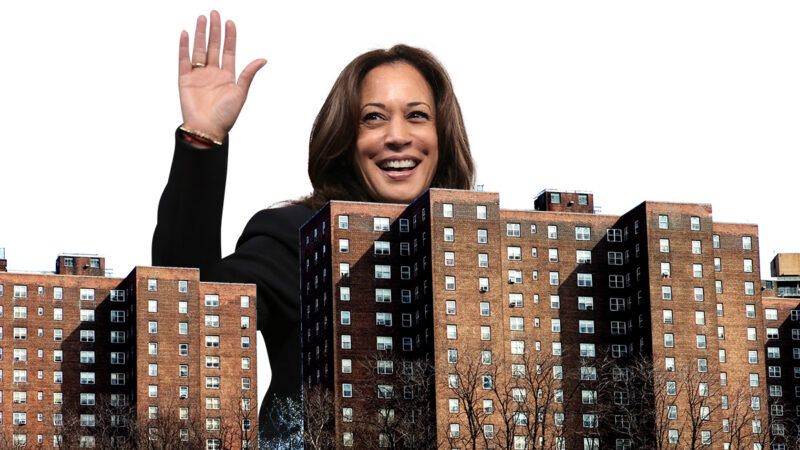Is Kamala Harris Really a YIMBY?
Harris rightly calls out regulations for causing the housing shortage, but she also supports rent control policies that will make it worse.

Is Kamala Harris running the first ever YIMBY ("yes in my backyard") campaign for president? She's certainly talking like she is, even though her housing platform is riddled with policy proposals that will make high housing costs worse.
"There's a serious housing shortage in many places. It's too difficult to build, and it's driving prices up," said Harris in a mid-August campaign speech laying out her economic policy agenda. "As president, I will work in partnership with industry to build the housing we need, both to rent and to buy. We will take down barriers and cut red tape, including at the state and local levels."
The vice president promised to deliver 3 million units of housing affordable to middle-class families by the end of her first term.
Her mention of high housing costs, and her speech accurately blaming them on state and local regulation, earned her rapturous praise from YIMBY commenters, including a few free marketers.
Kevin Erdmann, a scholar at the Mercatus Center at George Mason University, described Harris' remarks as "arguably the best pro-supply housing speech by a candidate this century."
Winning the rhetorical contest on housing is easy this election, given that former President Donald Trump has decided to stick with the classic NIMBY ("not in my backyard") promise to keep apartments out of single-family neighborhoods.
Yet when it comes to actual policy proposals, Harris' YIMBY credentials look far from sterling. For starters, she has fully embraced President Joe Biden's calls for a nationwide rent control scheme.
When he was still the Democratic nominee, Biden proposed capping yearly rent increases on existing buildings owned by larger landlords at 5 percent per year. Harris has doubled down on this idea, saying in a July speech that "we will take on corporate landlords and cap unfair rent increases."
Rent control has a rock-bottom reputation among economists for a reason. The economic literature could not be more clear that where rent control actually suppresses rents, the result is less rental housing supply and lower-quality rental housing stock.
One landmark 2019 study on rent control in Harris' old stomping ground of San Francisco found that property owners responded to an expansion of rent control by converting their existing rental units to for-sale condominiums that could be sold at any price.
When voters in St. Paul, Minnesota, approved a ballot initiative in 2021 that capped rent increases at 3 percent, and included none of the usual exemptions for new supply, developers fled. Thousands of proposed units disappeared overnight.
In New York, the state's 2019 tightening of a longstanding rent stabilization scheme has caused property values to plummet. Unable to pass on the costs of renovations and repairs under the newly tightened law, many New York landlords are letting their units sit vacant instead.
When the University of Chicago's Booth School of Business surveyed economists on the Biden-Harris rent control proposal specifically, almost all respondents said it would make housing availability worse, not better.
So for all Harris' pro-supply rhetoric, she's still willing to tout a policy that could only be expected to destroy new housing units.
Her counterproductive policies don't stop there.
Harris is also running on a plan to give first-time homebuyers $25,000 in down payment assistance, provided they've paid their rent on time for two years in a row.
Such a subsidy would, as intended, increase people's demand for purchasing a home and make them marginally less sensitive to the price. Existing homeowners could easily respond by raising the sale price of their home. The homebuyer might get the subsidy on paper, but the seller is pocketing it in practice. Home prices would go up, not down.
In the same speech where she called for less regulation on building housing, Harris also called for restrictions on institutional investors who are pouring capital into the growing business of build-to-rent single-family housing.
Given the tightening of mortgage credit and underwriting standards after the Great Recession, institutional investors are providing a crucial source of capital for new home construction. Any crackdown on them would be a crackdown on new supply.
Studies have shown that where investor-owned rental housing is banned, the share of lower-income renters living in single-family neighborhoods also decreases.
Harris talks a good game about increasing housing supply by cutting regulations on building new homes. Yet she's also endorsing a bunch of other price controls, subsidies, and new regulations that would work at cross-purposes with any deregulation.
Rent Free is a weekly newsletter from Christian Britschgi on urbanism and the fight for less regulation, more housing, more property rights, and more freedom in America's cities.


Show Comments (40)